- Home
- Alan Bennett
The Laying on of Hands: Stories Page 11
The Laying on of Hands: Stories Read online
Page 11
‘That’s if he doesn’t want him resuscitating,’ said Jean. ‘You don’t know.’
‘I wouldn’t want my dad resuscitating,’ said Hartley.
‘Denis might, mightn’t you Denis?’
‘No,’ said Midgley.
‘You often don’t get the choice,’ said Hartley. ‘They’ll resuscitate anybody given half a chance. Shove them on these life-support machines. It’s all to do with cost-effectiveness. They invest in this expensive equipment then they feel they have to use it.’ He pumped the lift button. ‘My guess is that it’ll be at four in the morning, the crucial time. That’s when life’s at its lowest ebb, the early hours.’
‘Miracles do happen, of course,’ said Jean. ‘I was reading about these out-of-body experiences. Have you read about them, Denis? It’s where very sick people float in the air above their own bodies. Personally,’ Jean kissed Midgley, ‘I think it won’t be long before science will be coming round to an after-life. Bye bye. I wish it had been on a happier occasion.’
Midgley went down the long corridor.
‘MONEY’S NO GOOD,’ said Aunty Kitty. ‘Look at President Kennedy. They’ve been a tragic family.’
The Indians slept, the little son laid with his head in the father’s lap.
An orderly came in and tidied the magazines, emptied the waste-bin and took away a vase of flowers.
‘Oxygen,’ he said as he went out.
‘The Collingwoods got back from Corfu,’ said Aunty Kitty. ‘They said they enjoyed it but they wouldn’t go a second time.’
It was after ten and Midgley had assumed she was going to stay the night when she suddenly got up.
‘If I go now I can get the twenty-to,’ she said. ‘I’ll just get back before they’re turning out. I never go upstairs. It’s just asking for it.’
‘I’ll walk down with you,’ said Midgley.
She tiptoed elaborately past the sleeping immigrants, favouring them with a benevolent smile.
‘They’ve got feelings the same as us,’ she whispered. ‘They’re fond of their families. More so, probably.’ They came out into the corridor. ‘But then they’re less advanced than we are.’
He phoned Joyce.
She and Colin were watching a programme about dolphins that had been introduced by the Duke of Edinburgh. Her mother was asleep with her mouth open.
‘What’re you doing?’ asked Midgley.
‘Nothing. Colin’s watching a programme about dolphins. How is he?’
Midgley told her.
‘I’ve got to stay,’ he finished.
‘Why? You’ve done all that’s necessary. Nobody’s going to blame you.’
Midgley saw that somebody had written on the wall ‘Pray for me.’ A wag had added ‘OK.’
‘I must be here when he goes,’ said Midgley. ‘You can understand that.’
‘I understand you,’ she said. ‘It’s not love. It’s not affection.’ Colin looked up. ‘It’s yourself.’
She put the phone down.
‘Dad?’ said Colin.
She turned the television off. ‘He’s hanging on.’
‘Who?’
‘Your grandad.’ She got up. ‘Wake up Mother. Time for bed.’
MIDGLEY WENT BACK and sat with his father. While he had been out the night nurse had come on. She was a plump girl, dark, less pert than the others, and, he thought, more human. Actually she was just dirty. The hair wasn’t gathered properly under her cap and there was a ladder in her stocking. She straightened the bedclothes, bending over the inert form so that her behind was inches from Midgley’s face. Midgley decided it wasn’t deliberate.
‘Am I in the way?’ he asked.
‘No,’ she said. ‘Why? Stop there.’
She looked at the television monitor for a minute or two, counting the jumps with her watch. Then she smiled and went out. Five minutes later she was back with a cup of tea.
‘No sugar,’ said Midgley.
‘May I?’ she said and put both lumps in her mouth.
‘Slack tonight,’ she said. ‘Still it just needs one drunken driver.’
Midgley closed his eyes.
‘I thought you were going to be a bit of company,’ she said. ‘You’re tired out.’ She fetched a pillow and they went out into the waiting room. The Indians had gone.
‘Lie down,’ she said. ‘I’ll wake you if anything happens.’
Around five an alarm went off, and there were two deaths in quick succession. Midgley slept on. At eight he woke.
‘You can’t lie down,’ said a voice. ‘You’re not supposed to lie down.’ It was a clean, fresh nurse.
Two women he had not seen before sat watching him.
‘The nurse said she’d wake me up.’
‘What nurse?’
‘If anything happened to my father.’
‘Whose is that pillow?’
‘Midgley. Mr Midgley.’
‘It’s a hospital pillow.’ She took it, and went back inside to her desk.
‘Midgley.’ Her finger ran down the list. ‘No change. But don’t lie down. It’s not fair on other people.’
Midgley went and looked at his father. No change was right. He felt old and dirty. He had not shaved and there was a cold sore starting on his lip. But with his father there was no change. Still clean. Still pink. Still breathing. The dot skipped on. He walked out to the car park where he had left his van and wondered if he dared risk going out to buy a razor.
He went back in search of the doctor.
He cut across the visitors’ car park, empty now except for his van, and took a path round the outside of the hospital that he thought would take him round to the entrance. The buildings were long and low and set in the hillside. They were done in identical units, every ward the same. He was passing a ward that seemed just like his father’s except where his father should have been a woman was just putting her breast to a baby’s mouth. A nurse came to the window and stared at him. He looked away hurriedly and walked on, but not so quickly as to leave her with the impression he had been watching. She was still staring at him as he turned the corner. He experienced a feeling of relief if not quite homecoming when he saw he was now outside Intensive Care. He picked out his father’s room, saw the carnations on the window sill and the head and shoulders of a nurse. She was obviously looking at the bed. She moved back towards the window to make room for someone else. Midgley stood on tiptoe to try and see what was happening. He thought there was someone else there in a white coat. The room was full of people.
Midgley ran round the unit trying to find a way in. There was a door at the end of the building with an empty corridor beyond. It was locked. He ran up to the path again, then cut down across the bank through some young trees to try another door. A man on the telephone watched him sliding down then put one phone down and picked up another. Midgley ran on and suddenly was in a muddy flower bed among bushes and evergreens. It was the garden around the entrance to the Reception Area. Upstairs he ran past the startled nurse at the desk and into his father’s room. Nobody spoke. There was an atmosphere of reverence.
‘Is he dead?’ said Midgley. ‘Has he gone?’ He was panting. An older woman in blue turned round. ‘Dead? Certainly not. I am the matron. And look at your shoes.’
Behind the matron Midgley caught a glimpse of his father. As a nurse bustled him out Midgley struggled to look back. He was sure his father was smiling.
‘I’ve just been to spend a penny,’ said Aunty Kitty. ‘When you consider it’s a hospital the toilets are nothing to write home about. Look at your shoes.’
She was beginning to settle in, had brought a flask, sandwiches, knitting.
‘I know Frank,’ she said, looking at Country Life. ‘He’ll make a fight of it. I wouldn’t thank you for a place in Bermuda.’
Midgley went to the gents to have a wash. He got some toilet paper and stood by the basins wiping the mud off his boots. He was stood with the muddy paper in his hands when an orderly came in, lo
oked at the paper then looked at him incredulously, shook his head and went into a cubicle saying: ‘The fucking public. The fucking dirty bastard public.’
Midgley went down to ring his Uncle Ernest on the phone outside physio. A youngish woman was just dialling.
‘Cyril. It’s …’ She held the mouthpiece away from her mouth and the earpiece from her ear. ‘It’s Vi. Vi. I am speaking into it. Mum’s had her op. No. She’s had it. Had it this morning first thing. She’s not come round yet, but I spoke to the sister and apparently she’s fine. FINE. And the sister says …’ She dropped her voice. ‘It wasn’t what we thought. It wasn’t what we thought. No. So there’s no need to worry.’ She ran her finger over the acoustic headboard behind the phone, fingering the holes. ‘No. Completely clear. Well I think it’s good news, don’t you? The sister said the surgeon is the best. Mr Caldecott. People pay thousands to have him. Anyway I’m so relieved. Aren’t you? Yes. Bye.’
As Midgley took the phone she took out her handkerchief and rubbed it over her lips, and safely outside the hospital, her ear.
UNCLE ERNEST had said on the phone that if this was going to go on he wasn’t sure he could run to the fares, but he turned up in the late afternoon along with Hartley.
He went and sat with his brother for a bit, got down and looked under the bed and figured out how the mechanism worked that lifted and lowered it and finally stood up and said, ‘Gillo, Frank,’ which was what he used to say when they went out cycling between the wars. It meant ‘hurry up’.
‘It’s Frank all over,’ said Aunty Kitty, ‘going down fighting. He loved life.’
There were a couple of newcomers in the waiting room, an oldish couple.
‘It’s their eldest daughter,’ whispered Aunty Kitty. ‘She was just choosing some new curtains in Schofields. Collapsed. Suspected brain haemorrhage. Their other son’s a vet.’
They trailed down the long corridor to the lift.
‘It’s a wonder to me,’ said Uncle Ernest, ‘how your Aunty Kitty’s managed to escape strangulation all these years. Was he coloured, this doctor?’
‘Which?’ said Midgley.
‘That said he was on his last legs.’
Midgley reluctantly admitted he was.
‘That explains it,’ said the old railwayman.
‘Dad,’ said Hartley.
‘What does that mean, “Dad”?’ said his father.
‘It means I’m vice-chairman of the community relations council. It means we’ve got one in the office and he’s a tip-top accountant. It means we all have to live with one another in this world.’ He pumped the button of the lift.
‘I’ll not come again,’ said Uncle Ernest. ‘It gets morbid.’
‘We’ve just got to play it by ear,’ said Hartley.
‘You won’t have this performance with me,’ said the old man. ‘Come once and have done.’
‘Shall I drop you?’ said Hartley as the doors opened.
‘I don’t want you to go out of your way.’
‘No, but shall I drop you?’
‘Press G,’ said Uncle Ernest.
The lift doors closed.
MIDGLEY WAS SITTING with his father when the plump night nurse came on.
‘I wondered if you’d be on tonight.’ He read her tab. ‘Nurse Lightfoot.’
‘Waiting for me, were you? No change.’ She took a tissue and wiped the old man’s mouth. ‘He doesn’t want to leave us, does he?’ She picked up the vase of carnations from the window sill. ‘Oxygen,’ she said and took them outside.
Later, when she had made him a cup of tea and Aunty Kitty had gone home for the second night, he was sitting at the bedside but got up when she started to give his father a bed bath.
‘You’re like one another.’
He stared out of the window, even moved to avoid seeing the reflection.
‘No,’ he said.
‘You are. It’s a compliment. He has a nice face.’ She sponged under his arms.
‘What are you?’ she said.
‘How do you mean?’ He turned just as she had folded back the sheets and was sponging between his legs. Quickly he looked out of the window again.
‘What do you do?’
‘Teacher. I’m a teacher.’ He wanted to go and sit in the waiting room.
‘What was he?’
‘Plumber.’
‘He’s got lovely hands. Real ladies’ hands.’
And it was true. She had finished and the soft white hands of his father lay over the sheet.
‘That happens in hospitals. People’s hands change.’ She held his father’s hand. Midgley wondered if he could ask her to hold his. Probably. She looked even more of a mess than the night before.
‘Is there anything you want to ask?’
‘Yes,’ said Midgley.
‘If there is, doctor’ll be round in a bit.’
It was a different doctor. Not Indian. Fair, curlyhaired and aged not much more than fourteen.
‘His condition certainly hasn’t deteriorated,’ the child said. ‘On the other hand,’ he glanced boyishly at the chart, ‘it can’t be said to have improved.’
Midgley wondered if he had ever had his ears pierced.
‘I don’t know that there’s any special point in waiting. You’ve done your duty.’ He gave him a winning smile and had Midgley been standing closer would probably have put his hand on his arm as he had been taught to do.
‘After all,’ he was almost conspiratorial, ‘he doesn’t know you’re here.’
‘I don’t think he’s dying,’ said Midgley.
‘Living, dying,’ said the boy and shrugged. The words meant the same thing.
‘You do want your father to live?’ He turned towards the nurse and pulled a little face.
‘I was told he wasn’t going to last long. I live in Hull.’
‘Our task is to make them last as long as possible.’ The pretty boy looked at his watch. ‘We’ve no obligation to get them off on time.’
‘Some of them seem to think we’re British Rail,’ the doctor remarked to a nurse in the small hours when they were having a smoke after sexual intercourse.
‘I don’t like 15-year-old doctors, that’s all,’ said Midgley. ‘I’m old enough to be his father. Does nobody else wait? Does nobody else feel they have to be here?’
‘Why not go sleep in your van? I can give you a pillow and things.’ She was eating a toffee. ‘I’ll send somebody down to the car park if anything happens.’
‘What do you do all day?’ asked Midgley.
‘Sleep.’ She was picking a bit of toffee from her tooth. ‘I generally surface around three.’
‘Maybe we could have a coffee. If he’s unchanged.’
‘OK.’
She smiled. He had forgotten how easy it was.
‘I’ll just have another squint at my dad.’
He came back. ‘Come and look. I think he’s moved.’
She ran ahead of him into the room. The old man lay back on the pillows, a shaded light by the bed.
‘You had me worried for a moment,’ she said. ‘It’s all right.’
‘No. His face has changed.’
She switched on the lamp over the bed, the light so sudden and bright that that alone might have made the old man flinch. But nothing moved.
‘It’s just that he seemed to be smiling.’
‘You’re tired,’ she said, put her hand against his face and switched out the light.
Midgley switched it on again.
‘If you look long enough at him you’ll see a smile.’
‘If you look long enough,’ she said, walking out of the room, ‘you’ll see anything you want.’
Midgley stood for a moment in the darkened room, wishing he had kissed her when he’d had the chance. He went out to look for her but there had been a pileup on the M62 and all hell was about to break loose.
‘WHAT DO YOU DO ALL DAY?’ said his wife on the phone. ‘Sit in the waiting room. Sit in his room. Walk
round the hospital.’
‘Don’t they mind?’
‘Not if they’re going to die.’
‘Is he, though?’ said his wife, watching her mother who had taken up her station on the chair by the door, holding her bag on her knees, preparatory to going to bed. ‘It seems a long time.’ The old lady was falling asleep. Once she had slipped right off that chair and cracked her head on the sideboard. That had been a hospital do.
‘I can’t talk. Mum’s waiting to go up. She’s crying out for a bath. I’m just going to have to steel myself.’ The handbag slipped to the floor.
‘I need a bath,’ said Midgley.
‘Go over to your dad’s,’ said his wife. ‘Mum’s falling over. Bye.’
‘What am I doing sat on this seat?’ said her mother, as she got her up. ‘I never sit on this seat. I don’t think I’ve ever sat on this seat before.’
IN THE MORNING Midgley was woken by Nurse Lightfoot banging on the steamed-up window of the van. It was seven o’clock.
‘I’m just going off,’ she was mouthing through the glass.
He wound down the window.
‘I’m just coming off. Isn’t it a grand morning? I’m going to have a big fried breakfast then go to bed. I’ll see you at teatime. You look terrible.’
Midgley looked at himself in the driving mirror, then started up the van and drove after her, hooting.
‘You’re not supposed to hoot,’ she said. ‘It’s a hospital.’
‘I forgot to ask you. How’s my dad?’
‘No change.’ She waved and ran down a grass bank towards the nurses’ flats. ‘No change.’
His dad lived where he had lived once, at the end of a terrace of redbrick back-to-back houses. It was an end house, as his mother had always been careful to point out. It gave them one more window, which was nice, only kids used the end wall to play football against, which wasn’t. His dad used to heave himself up from the fireside and go out to them, night after night. He let himself in with the key he had had since he was 14. ‘You’re 21 now,’ his mother had said.
The house was neat and clean and cold. He looked for some sign of interrupted activity, even a chair out of place, some clue as to what his father had been doing when the blow fell. But there was nothing. He had a home help. She had probably tidied up. He put the kettle on, before having a shave. He knew where everything was. His dad’s razor on the shelf above the sink, a shaving brush worn down to a stub and a half-used packet of Seven O’Clock blades. He scrubbed away the caked rust from the razor (‘Your dad doesn’t care,’ said his mother) and put in a new blade. He had never gone in for shaving soap. Puritan soap they always bought, green Puritan soap. Then having shaved he took his shirt off to wash in the same sequence he had seen his father follow every night when he came in from work. Then, thinking of the coming afternoon, he did something he had never seen his father do, take off his trousers and his pants to wash his cock. He smelled his shirt. It stank. Naked, white and shivering he went through the neat sitting room and up the narrow stairs and stood on the cold lino of his parents’ bedroom looking at himself in the dressing-table mirror. On top of the dressing-table, stood on little lace mats, was a toilet set. A round glass jar for a powder-puff, a pin tray, a cut-glass dish with a small pinnacle in the middle, for rings, and a celluloid-backed mirror and hairbrush. Items that had never had a practical use, but which had lain there in their appointed place for forty years.

 The Uncommon Reader: A Novella
The Uncommon Reader: A Novella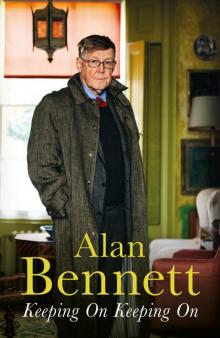 Keeping On Keeping On
Keeping On Keeping On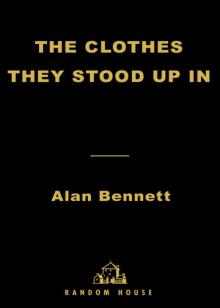 The Clothes They Stood Up In
The Clothes They Stood Up In Smut: Stories
Smut: Stories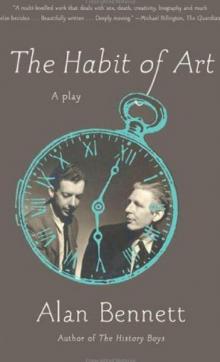 The Habit of Art: A Play
The Habit of Art: A Play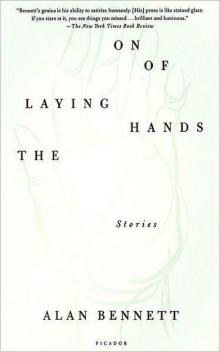 The Laying on of Hands: Stories
The Laying on of Hands: Stories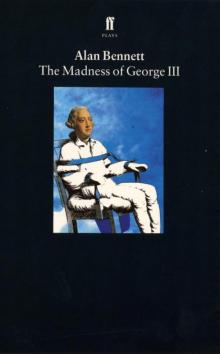 The Madness of George III
The Madness of George III Writing Home
Writing Home The Complete Talking Heads
The Complete Talking Heads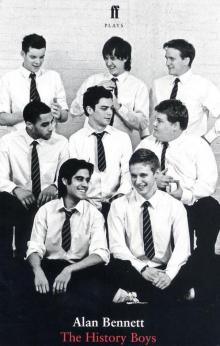 The History Boys
The History Boys Lady in the Van
Lady in the Van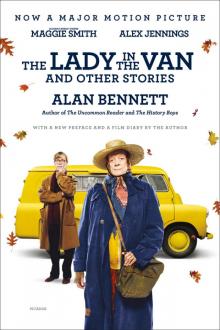 The Lady in the Van
The Lady in the Van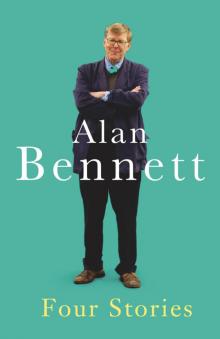 Four Stories
Four Stories Alan Bennett: Plays, Volume 2
Alan Bennett: Plays, Volume 2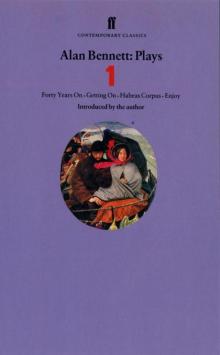 Alan Bennett: Plays, Volume 1
Alan Bennett: Plays, Volume 1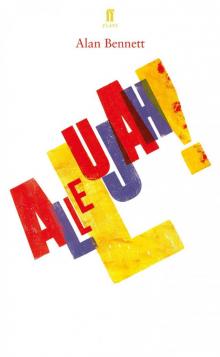 Allelujah!
Allelujah! Untold Stories
Untold Stories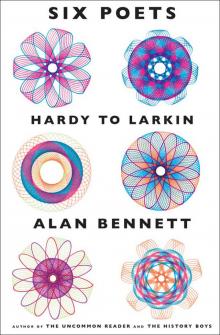 Six Poets
Six Poets